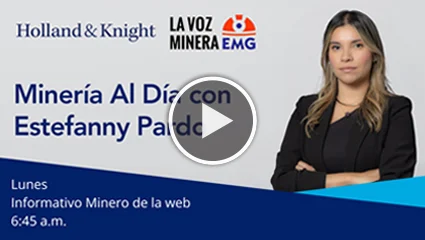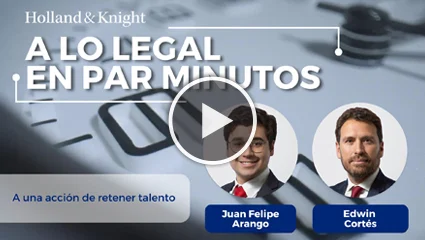Mexican Businesses May Consider Electronic Signatures for Signing Legal Documents Amid COVID-19
Holland & Knight Offers Clients the Option of Virtual Signing through DocuSign
Highlights
- Electronic execution of legal documents in Mexico may be useful amid social distancing measures in place to slow the spread of COVID-19.
- Electronic signatures in Mexico are valid and enforceable as long as they meet certain technical requirements.
- There are many types of digital and electronic signatures with different levels of reliability.
Companies, financial entities and service providers may consider the execution of legal documents using electronic means in the context of social distancing measures and other precautions currently in place amid the spread of the COVID-19 disease in Mexico.
Below is a high-level summary of the validity and enforceability of electronic signatures in Mexico (including cross-border aspects) and a description of Holland & Knight's electronic signature platform, DocuSign. This document does not constitute specific legal advice. Please contact Holland & Knight attorneys for legal advice regarding transactions and business operations.
Validity and Enforceability of Electronic Signatures in Mexico
Electronic signatures are valid and enforceable in Mexico and create legal obligations among contracting parties, provided that such signatures satisfy certain technical requirements set forth in Article 97 of Mexico's Commerce Code (CC).
Generally, using an electronic signature is a legal way of expressing a signatory's consent with respect to the information contained in a given data message. It produces the same legal effects as a handwritten signature and is considered as admissible evidence in court proceedings.
Please note that some legal documents (e.g., the execution of a mortgage) require additional formalities in order to be perfect or enforceable against third parties. Such formalities include the execution of public deeds and filings with public registries and regulators.
Electronic signatures in Mexico need to satisfy the following technical requirements:
- The signature creation data are, within the context in which they are used, linked to the signatory and to no other person.
- The signature creation data were, at the time of signing, under the control of the signatory and of no other person.
- Any alteration to the electronic signature, made after the time of signing, is detectable.
- With respect to providing assurance as to the integrity of the data message to which it relates, any alterations made to the information contained therein after the time of signing is detectable.
Validity of Contracts and Legal Documents
Any contract or legal document executed by electronic means or using electronic signatures should be legally binding and enforceable, provided that (i) the data message documenting such contract or legal document remains complete (íntegro)and unaltered, (ii) the electronic signature complies with the technical requirements described above and (iii) the law does not require additional formalities such as notarization or filing with public registries or regulators.
Use of DocuSign Platform
DocuSign is a digital platform that provides a method for sending and receiving electronically executed messages/documents using electronic signatures. Holland & Knight offers its clients the DocuSign tool to manage and coordinate the electronic execution of transaction documents.
General Recommendations
A number of Holland & Knight clients use software and applications such as DocuSign to execute and document their transactions in the regular course of their business operations. Below are general recommendations for implementing the use of electronic signatures:
- Identify and refer to any master/general purchase agreement (Master Agreement) governing the contractual and commercial relationship between parties.
- If there is a Master Agreement, include a reference to the applicable law and jurisdiction under such agreement; or, if there is no Master Agreement, include a provision/clause regulating the law and jurisdiction applicable to the specific agreement/legal document (for validity purposes of the electronic signature, the applicable law may be Mexican law or otherwise).
- Include a brief provision stating that the parties acknowledge and agree to express their consent through electronic means using DocuSign or other software.
- Ensure that any software or digital platform used for the remote exchange of signatures or the execution of documents issues a certificate that complies with the technical requirements set forth in Article 97 of the CC and maintains the integrity and completeness of the executed document.
Cross-Border Aspects
Following the principle of technological neutrality, Mexican law gives legal effect to documents and agreements executed abroad electronically provided that the digital certificate produced in connection with the executed document offers an equivalent level of reliability compared to the requirements under Mexican law.
The CC states that this level of reliability is met when the certificate satisfies requirements set forth in international treaties and instruments to which Mexico is a party. Mexican law replicated the international standards for such certificates contemplated in the United Nations Commission on International Trade Law (UNCITRAL) Model Law of Electronic Signatures, and therefore a certificate issued abroad that complies with the requirements set forth in the CC would be deemed as a having an equivalent level of reliability.
Signing Options and General Recommendations
Note that there are many types of digital and electronic signatures with different levels of reliability. All of these options may be valid and enforceable electronic signatures under Mexican law provided that the data messages, digital certificates and technical features satisfy the requirements of the CC.
Exchange via email | Scanned signatures digital images (PDF, JPEG, etc.) | Electronic consent (click to sign or biometric approval) | Digital platform for electronic signature (e.g., DocuSign) |
-A document in final form is sent by email by one party to the other party. -An executed document or signature page is signed and scanned and sent back with a sign-off or release message pursuant to agreed execution instructions. | -A PDF or a JPEG file of a signatory's signature is saved. -The PDF/JPEG signature is attached or associated with an electronic document to produce an executed version. | -With click to sign signatures, consent or approval is informed via the acceptance of terms and conditions applicable to the contents of the message. -A data trial is digitally produced in order to document the signature. -Fingerprint, face-recognition or eye-scan technology is used to authenticate a body part unique to a signatory. -Authentication confirms the acceptance of terms and conditions applicable to the contents of the message. -A data trial is digitally produced in order to document the signature. | -A party/signatory opens a link sent by email by the other signatory/party (or by a third party coordinating the execution of a document) and signs an execution version following signing instructions. -Upon execution by each party, the platform creates a fully signed PDF version of the document and sends it to both parties and/or the third-party coordinator. -A digital certificate is produced, recording who signed the document, the time and date of signing and the IP address of each signatory's computer. -The executed PDF document is preserved digitally pursuant to the platform's technical features. |
To learn more about the COVID-19 outbreak and its effects on the banking and finance industry in Mexico, please contact Alejandro Landa, partner of Holland & Knight's Financial Services practice in the Mexico City office.
DISCLAIMER: Please note that the situation surrounding COVID-19 is evolving and that the subject matter discussed in these publications may change on a daily basis. Please contact the author or your responsible Holland & Knight lawyer for timely advice.
Information contained in this alert is for the general education and knowledge of our readers. It is not designed to be, and should not be used as, the sole source of information when analyzing and resolving a legal problem. Moreover, the laws of each jurisdiction are different and are constantly changing. If you have specific questions regarding a particular fact situation, we urge you to consult competent legal counsel.
Related Insights


